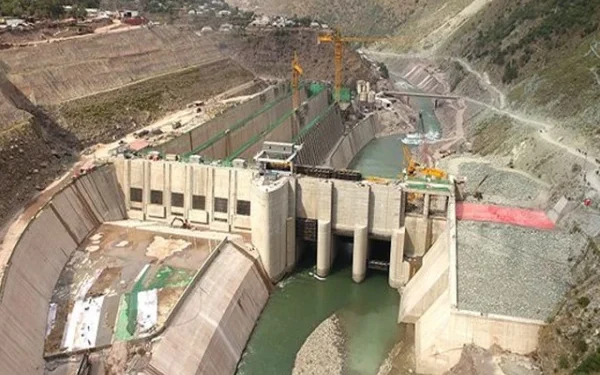Introduction: Accountability in Mega Infrastructure Projects
ISLAMABAD – In a significant development aimed at ensuring accountability in national infrastructure projects, Federal Minister for Planning and Development Ahsan Iqbal announced that Prime Minister Shehbaz Sharif has officially constituted an inquiry commission to investigate the tunnel subsidence in the Rs500 billion Neelum-Jhelum Hydropower Project (NJHP).
This major hydropower project, located in Azad Jammu and Kashmir (AJK), has been plagued by engineering failures that led to the shutdown of operations in 2023, causing a considerable setback to the country’s energy sector. The government’s move to form a commission is a crucial step in holding the responsible parties accountable and ensuring the integrity of future infrastructure initiatives.
Neelum-Jhelum Hydropower Project: A Brief Overview
The Neelum-Jhelum Hydropower Project is one of Pakistan’s most ambitious energy ventures, designed to generate 969 megawatts of electricity by diverting water from the Neelum River through a 60 km long tunnel system. The project aimed to help mitigate Pakistan’s chronic energy shortages by adding low-cost hydropower to the national grid.
Key Features:
- Total Project Cost: Rs500 billion (approximately $3.5 billion)
- Completion Year: Operationalized in April 2018
- Location: Muzaffarabad, Azad Jammu & Kashmir
- Funding Sources: A combination of domestic funds and foreign loans, including assistance from China, Saudi Arabia, and Islamic Development Bank
Despite its promising potential, the project has faced repeated delays, cost overruns, and now, structural failure that has forced its closure.
The Tunnel Collapse: What Went Wrong?
In May 2023, operations of the NJHP were suspended after signs of subsidence and structural distress were detected in one of its primary water tunnels. The incident raised alarm bells not only within WAPDA (Water and Power Development Authority), which operates the project, but also among policymakers and engineers.
Ahsan Iqbal termed the tunnel failure a “costly and significant mistake,” which could have been avoided with better oversight and engineering diligence.
Key Facts About the Tunnel Incident:
- Date of Closure: May 2023
- Estimated Repair Cost: Rs20 billion (as suggested by WAPDA)
- Alternative Rebuilding Cost: Rs250–300 billion
- Project Status: Shut down pending repairs or reconstruction
Formation of Inquiry Commission: Mandate and Scope
During his press conference, Ahsan Iqbal revealed that two technical committees had earlier submitted detailed reports on the tunnel subsidence. Based on their findings, the Prime Minister has now constituted a full-fledged commission under the Pakistan Commission of Inquiry Act 2017.
Commission Leadership and Timeline
- Chairman: Justice (retd) Tariq Abbasi
- Deadline: August 20, 2025
- Legal Basis: Pakistan Commission of Inquiry Act 2017
The commission has been tasked with identifying:
- Serious negligence
- Procedural misconduct
- Potential criminal liability
It will also recommend legal, administrative, and financial action against those found responsible for the failure.
Mandate of the Commission
The commission will probe every stage of the project, from initial design and planning to construction and maintenance. Specific areas of focus include:
- Engineering Failures – Evaluation of tunnel design and construction quality.
- Project Oversight – Responsibility of WAPDA and supervising consultants.
- Procurement Irregularities – Scrutiny of contractor and subcontractor roles.
- Financial Mismanagement – Over-invoicing, delayed payments, or misappropriations.
- Safety Protocols – Assessment of tunnel safety inspections prior to failure.
Government’s Broader Vision: Preventing Future Disasters
Ahsan Iqbal emphasized that this inquiry is not only about punishing those responsible but also about setting a precedent for future projects. The inquiry aims to strengthen Pakistan’s institutional capacity for project management, particularly in high-risk sectors like water and power infrastructure.
He stated:
“This is a matter of national importance. The failure of a Rs500 billion project is not a small error; it reflects systemic weaknesses that we must correct.”
Economic Performance and National Strategy: “Udan Pakistan”
Beyond the Neelum-Jhelum issue, the Planning Minister also shed light on the government’s recent economic achievements. He highlighted that inflation has dropped to an average of 4.5%, the lowest level since 2016, reflecting fiscal discipline and policy stability.
He credited this success to:
- Effective fiscal consolidation
- Stable external sector performance
- Restoration of investor confidence
The government’s development strategy, titled “Udan Pakistan,” remains focused on high-priority sectors that ensure inclusive growth.
Pillars of Udan Pakistan:
- Export-Oriented Growth
- Digital Transformation
- Green Energy Transition
- Energy Security
- Social Equity and Inclusivity
Ahsan Iqbal noted that the current Public Sector Development Programme (PSDP) is aligned with these goals, with resources directed toward impactful and sustainable projects.
WAPDA’s Role and Future of NJHP
The Water and Power Development Authority (WAPDA) has come under increased scrutiny for its role in the NJHP disaster. WAPDA initially recommended a Rs20 billion tunnel repair but also acknowledged that full tunnel reconstruction might become necessary if repair proves ineffective.
Moving forward, WAPDA has pledged full cooperation with the inquiry commission and committed to following its recommendations.
Public Accountability and Transparency
This case has highlighted the importance of transparency and accountability in mega infrastructure projects, particularly those involving billions in public and foreign investments. Citizens and civil society organizations have demanded answers on how such a large-scale failure occurred within just five years of the project’s commissioning.
The government’s proactive approach in setting up a judicial inquiry may help:
- Restore public trust
- Deter future negligence
- Ensure that technical, environmental, and safety standards are adhered to strictly
Conclusion: A Test of Governance and Institutional Integrity
The Neelum-Jhelum Hydropower Project tunnel collapse has raised serious concerns about project execution, engineering standards, and institutional oversight in Pakistan. By constituting an inquiry commission led by a retired judge, the government has taken a crucial step toward ensuring that such monumental mistakes are not repeated.
This investigation will serve as a litmus test for the state’s commitment to accountability and may set a new benchmark for governance and oversight in Pakistan’s development sector.
As the country continues to invest heavily in infrastructure under its Vision 2025 and Udan Pakistan initiatives, the findings and recommendations of the Neelum-Jhelum Inquiry Commission will be closely watched by both domestic and international stakeholders.

























